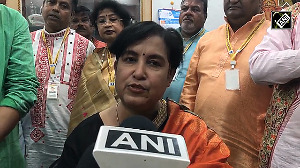As large parts of India and Pakistan experience scorching temperatures, the UN's specialised agency on weather has said while it is premature to attribute the extreme heat in the two countries solely to climate change, it is consistent with a changing climate, with heatwaves starting earlier than in the past.

Extreme heat is gripping large parts of India and Pakistan, impacting hundreds of millions of people in one of the most densely populated parts of the world, the World Meteorological Organisation said on Friday.
It said that according to The India meteorological department, maximum temperatures reached 43-46 degrees Celsius in widespread areas on April 28 and that this intense heat will continue until May 2.
The Pakistan meteorological department said that daytime temperatures are likely to be between 5 degrees Celsius and 8 degrees Celsius above normal in large swathes of the country.
"It is premature to attribute the extreme heat in India and Pakistan solely to climate change. However, it is consistent with what we expect in a changing climate. Heatwaves are more frequent and more intense and starting earlier than in the past," the WMO said.
The global body added that national meteorological and hydrological departments in both countries are working closely with health and disaster management agencies to roll out heat health action plans which have been successful in saving lives in the past few years.
"Heatwaves have multiple and cascading impacts not just on human health, but also on ecosystems, agriculture, water and energy supplies and key sectors of the economy," the WMO said adding that the risks to society underline why it is committed to ensuring that multi-hazard early warning services reach the most vulnerable.
It noted that the heatwave was triggered by a high-pressure system and follows an extended period of above average temperatures. India recorded its warmest March on record, with an average maximum temperature of 33.1 degrees Celsius, or 1.86 degrees Celsius above the long-term average.
Pakistan also recorded its warmest March for at least the past 60 years, with a number of stations breaking March records.
"In the pre-monsoon period, both India and Pakistan regularly experience excessively high temperatures, especially in May. Heatwaves do occur in April but are less common. It is too soon to know whether new national temperature records will be set," the WMO said.
The WMO noted that India has established a national framework for heat action plans through the National Disaster Management Authority which coordinates a network of state disaster response agencies and city leaders to prepare for soaring temperatures and ensure that everyone is aware of heatwave Do's and Don't's.
It added that the city of Ahmedabad was the first South Asian city to develop and implement a city-wide heat health adaptation in 2013 after experiencing a devastating heatwave in 2010.
"This successful approach has been expanded to 23 heatwave-prone states and serves to protect more than 130 cities and districts," it said.
The WMO added that both India and Pakistan have successful heat-health early warning systems and action plans, including those specially tailored for urban areas.
Heat action plans reduce heat mortality and lessen the social impacts of extreme heat, including lost work productivity.
"Important lessons have been learned from the past and these are now being shared among all partners of the WMO co-sponsored Global Heat Health Information Network to enhance capacity in the hard-hit region," it said.
The WMO said that the Intergovernmental Panel on Climate Change, in its sixth assessment report, said that heatwaves and humid heat stress will be more intense and frequent in South Asia this century.
The WMO also cited an open-access publication recently issued by India's Ministry of Earth Sciences that highlights that the frequency of warm extremes over India has increased during 1951-2015, with accelerated warming trends during the recent 30 year period 1986-2015.
The publication also notes that pre-monsoon season heatwave frequency, duration, intensity and areal coverage over India are projected to substantially increase during the twenty-first century.
Civil society, such as the Red Cross Red Crescent Society and the Integrated Research and Action for Development, also play a critical role, deploying lifesaving communications and interventions to vulnerable communities, the WMO said.











 © 2025
© 2025